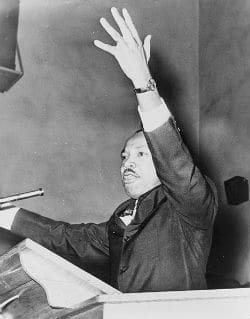
Martin Luther King, Jr. was an incredible orator, harnessing the power of words rather than weapons as he lead this country on its road to civil liberty. In fact, many of his speeches have the power of poetry, using some of the same conventions writers use when composing poems: alliteration, personification, simile, repetition, metaphor, and even rhyme. So, what better way to celebrate Martin Luther King Day than with words?
Here are some examples of poetry based activities you can do to commemorate Martin Luther King, Jr. on the third Monday of each January… or any time you feel so inspired!
Activity One: Let Freedom Ring
In Martin Luther King Jr.’s famous 1963 “I Have a Dream Speech,” he uses repetition to drive home his talking points. This kind of convention not only works to emphasize key phrases, but it also gives the writing a nice cadence. Below is an excerpt from that speech that I have organized into a poetic form.
Let Freedom Ring
Let freedom ring from the snowcapped Rockies of Colorado!
Let freedom ring from the curvaceous slopes of California!
But not only that;
let freedom ring from Stone Mountain of Georgia!
Let freedom ring from Lookout Mountain of Tennessee!
Let freedom ring from every hill and molehill of Mississippi.
From every mountainside,
let freedom ring.
From where else could freedom ring? Your playground? Your classroom? The library… or maybe even your own heart? Try writing a poem in which each line begins with “Let freedom ring…”
Activity Two: Stand Up for Your Cause
Doctor King was a leader in the cause of civil liberty. What cause do you hold dear to your heart? There are many social inequalities that people are passionate about: Woman’s rights, the right to health care, animal welfare, anti-bullying, ending hunger, and many more. In this activity, choose a cause that gets your heart pounding and write a poem about it!
- Start by choosing your cause. I will choose bullying.
- Figure out what style of poetry you’d like to use. Try to choose something similar to what Martin Luther King Jr. might have used when leading the people against injustice. For example, a Haiku may not inspire people to march in the streets, where a strong rhyming verse could be used as a rallying cry for a movement. I’m going to choose rhyming verse. You might also try the repetition used in the last activity.
- Write your poem. If you need help, go to the Poetry Lessons section of this web site.
Here’s my example:
Stand Up
Stand up against the bully.
Come and join the fight.
Stand up against the bully.
Try to do what’s right.Sometimes it’s tough
to speak your mind.
The going’s rough
to get behind
the kid who’s teased and kicked around,
to pick him up when he is down.But stand up against the bully.
Do what you can do.
Stand up against the bully,
Just maybe you’ll help him too.
Activity Three: Find the Poem
Dr. King uses poetic language throughout his speeches. Try reading through one or more of his most famous ones, and pull out one section that really sound like a poem to you. Arrange it on paper in a poetic format. You do this in several ways:
- Start each line with the same phrase (repetition, as in Activity One)
- Make the poem take a shape. For example:
A poem
that is all
about a mountain
may get taller in the middle
and then shorter on
the ends so that
it takes on the
mountain’s
shape.
- End lines with rhyming, or close to rhyming, words.
- Separate stanzas to emphasize certain words or emotions.
Here is an example of finding a poem in one of Dr. King’s speeches. This excerpt is from “The Birth of a New Nation.” I have rearranged it to show emphasis and rhyme.
Promised Land
There is a great day ahead.
The future is on its side.
It’s going now through the wilderness,
but the Promised Land is ahead.
After completing one or more of these activities as a class or group, get together and have a reading on Martin Luther King Day, because sometimes words take on their greatest strength when spoke aloud.






